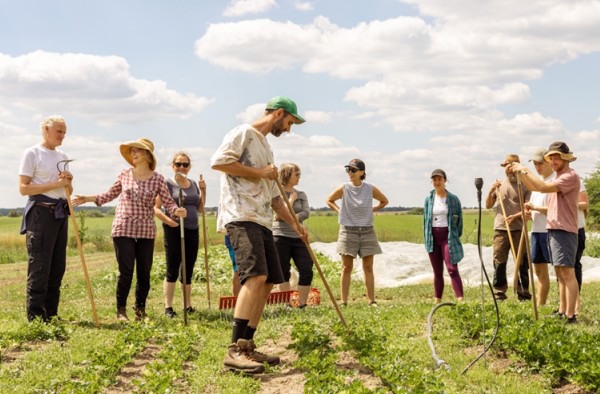In January and February of this year, those involved in the KOPOS project, together with external experts, selected two model projects by means of a public tendering process. of this year to select two model projects. These projects are to be used to try out approaches to solving regionally specific challenges and to test them for sustainability effects. "The special feature of the transformative
research approach is that science and practice engage together in a search and learning process that also provides for concrete interventions," says project coordinator Sebastian Rogga. "This allows us to learn whether such approaches are future-proof."
Transformative research projects create contributions to sustainability challenges and involve relevant practice partners in the process. Sometimes, there is a lack of resources to put the ideas developed into practice, to test them and to learn from the test run. The "KOPOS" project, funded by the BMBF and coordinated by the Leibniz Centre for Agricultural Landscape Research (ZALF), addresses this problem and breaks new ground. Since these interventions can hardly be implemented from a desk, the KOPOS project has sought cooperation with innovative practitioners in two model regions. Further research is now to be conducted jointly.
As an incentive for the sponsors of the model projects, they can each draw on 100,000 euros as well as the network contacts and expertise of the KOPOS team.
New bundling structures to strengthen regional value chains in Freiburg
In the project region of Freiburg, the KOPOS project partners (the research company Die AGRONAUTEN, the Nutrition Council Freiburg and Region, the City of Freiburg (Environmental Protection Agency) and the Biomusterregion Freiburg) are researching the challenge of a lack of short - i.e. regional - value chains for food. Production and marketing structures for regional products are certainly in place, but beyond direct marketing, they are optimized for the supply of and demand for large quantities and volumes that wholesalers dictate. On the other hand, the potential of many rural producers is not yet fully exploited in the Freiburg region.
"Their surpluses from direct marketing have had a market so far, because the volumes supplied are too small for wholesalers," says Wolfgang Hees, chairman of the Biogemüse Südwest producer association and a partner in the model project in Freiburg.
 © M. Doradzillo. At the wholesale market in Freiburg / source: M. Doradzillo.
© M. Doradzillo. At the wholesale market in Freiburg / source: M. Doradzillo.
Infrastructure for small-scale organic products at the wholesale market in Freiburg
Freiburg model project participants want to jointly create the bundling for organically produced food by setting up a corresponding infrastructure at the wholesale market in Freiburg will be set up.
"Until now, the wholesale market bundled regional products from many small producers. There has not been a corresponding bundling structure for organic products on site," says Sabine Fey, the managing director of Großmarkt Freiburg Ltd. "With the KOPOS project, we can now test whether the wholesale market can open up new business areas and address new target groups as a result," says Fey.
This infrastructure also opens up new marketing options for companies switching from conventional to organic produce, for start-ups and for B-goods. The wholesale market's clientele are typically small and medium-sized businesses involved in out-of-home catering and retail (such as smaller canteens, restaurants, weekly market traders, daycare centers), which can generate a lot of leverage for demand for regional organic food.

A Tiny Farm in Buchholz-Steinhöfel (LK Märkisch-Oderland) / Photo: C.Ulrich
Cooperation with Tiny Farms
The model project is aided by the municipality of Rheinhausen, which wants to set up a distribution point for the organic products handled at the wholesale market, and the social enterprise "nearbuy", which will set up a digital goods and communication platform specifically for the Freiburg region. Access to land via access to agriculture in Berlin-Brandenburg In the Berlin-Brandenburg project region, where the focus is on improving access to agricultural land, the KOPOS team (coordinated by the Flächensicherung network in cooperation with Berliner Stadtgüter and ZALF) will be working with the company Tiny Farms in the future. The young Berlin company plans to combine a network of micro and fragmented land they lease in the region into a virtual large-scale farm and make it competitive by pooling resources.
The key to this business model lies in the management of labor, which the company trains and qualifies to be an agricultural entrepreneur. to be entrepreneurial. "We are lowering the high barriers to entry into farming, and in doing so, giving people the opportunity to try their hand at farming," says Tiny Farms co-founder Jacob Fels. "In doing so, we are demonstrating a concrete approach to counteract the acute shortage of personnel, which is especially prevalent in professional vegetable farming," Fels continues.
This means the company explicitly addresses people from the urban environment who aspire to (part-time) employment in vegetable growing or who want to try their hand in the professional field. The young company, which is well networked in the alternative Berlin food scene, has so far developed four small Brandenburg sites, each smaller than one hectare, into microfarms.
The next step for the company, which will be tried out as part of the model project, is now to spin it off to future farmers. "Within the KOPOS framework, we can concretely play out this spin-off with two young people who already went through our training program last year," says Tobias Leiber, also a co-founder of Tiny Farms.
The future farmers will receive intensive support from Tiny Farms and will be able to make use of the company's services (e.g. seedling delivery, marketing channels, cultivation planning), depending on their needs and qualifications.
The KOPOS project will provide research support for both model projects until the fall of 2024.
For more information:
[email protected] 
[email protected]
[email protected]
[email protected]
[email protected]
[email protected]
[email protected]
[email protected]










